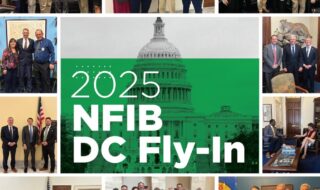December 30, 2024
Small Business Escapes Relatively Unharmed Amidst Legislative Drama
Small businesses escaped 2024 relatively unharmed from the last days of the state legislature in December. Because House Republicans won majority and there will no longer be a Democrat Trifecta, there was a huge push by interest groups to pass a flurry of damaging anti-small business legislation, including changes to workers compensation and 12-week paid family medical leave. Fortunately for NFIB members, the House majority completely fell apart in the waning days of the session.
On Friday, December 13, 2024, in a rare Friday session, House Republicans left the House Chamber and have refused to come back into session until there is action on the tipped wage and paid sick leave, requiring House Democrats to have all of their 56 members in attendance to vote on and pass legislation. House Republicans never returned to session. On Wednesday, December 30, 2024, Rep. Karen Whitsett (D-4) of Detroit refused to come back to session unless certain legislation was voted on including changes to the paid sick leave law and the tipped wage as requirement for attending session. This left the House without the ability to vote on any bills, and on the afternoon of Thursday, December 19, adjourned for the year. The Senate then went on to pass as many bills as they could in a record setting 29-hour session.
Below are the issues that have passed or stopped for this session.
Earned Sick Time & Minimum Wage
Unfortunately, the Michigan Legislature failed to make critical changes for small businesses to the Earned Sick Time Act and Minimum Wage (restoration of the tipped wage). See more information HERE.
SMALL BUSINESS LOSSES
• Increase in Unemployment Insurance Benefits and Duration
Senate Bill 40 was signed into law by Governor Whitmer on December 23, 2024. SB 40 will increase unemployment insurance weekly benefits from $364 to $614 over three years and indexes it to on thereafter. It also increases the duration from 20 to 26 weeks.
• Plumber Ratios
Also signed into law was Senate Bill 740 which creates an apprentice to master plumber ratio on job sites. Currently, there are no ratios, so this law could be especially challenging for non-union plumbing businesses.
• Wage Garnishment
House Bill 4900 makes it harder to garnish paychecks in order to pay off debts. It will reduce the amount of earnings that can be garnished from 25% to 15% percent regardless of income. This has passed both the Senate and House but has not been signed by the Governor as of 12/30/24.
• Rescind Public Employee Benefit Reform
House Bill 6058 eliminates requirement on public employees to pay at least 20% of their health benefit cost; reform originally put in place to help stem rising cost to taxpayers in both state and local governments. Passed both the Senate and House but has not been signed by the Governor as of 12/30/23.
HIGHLIGHTS OF ANTI-SMALL BUSINESS LEGISLATION THAT WAS STOPPED
*Click HERE for a complete list
• Family Leave Optimized Benefits (paid family leave): Unemployment Insurance style program that would allow employees up to 12 weeks of paid family leave – included a tax on employers and employees.
• Elimination of Local Preemption on Labor Mandates: Legislation would have removed the local preemptions put in place on wage and hour issues that prevent locals from passing their own minimum wage, paid sick leave policies, etc.
• Independent Contractor (1099 employees) Definition Change: Legislation would have used the California ABC test and essentially eliminated independent contractors (1099 employees) in Michigan.
• Workers Compensation Changes: Legislation would have eliminated 2011 reforms, changed and watered down definition of disability; allowed claims going back to the 1980s.
• Wage Theft & Pay Equity Bill Packages: Legislation would have increased fines and penalties on wage and hour violations including making some of them felonies; would update wage and hour discrimination to all protected classes in the Elliott-Larsen Act (including sexual identity, gender, weight, etc.); allowed for private right of action; allowed for employees to be told the salary of other employees in the same position; eliminated non-compete agreements; ; mandatory job descriptions.
• Bottle Deposit Law Expansion: Legislation would have expanded deposits to non-carbonated beverages like fruit juices and bottled water.
• Water Management Districts/Stormwater Fees “Rain Tax”: Legislation that would have allow local governments to levy taxes on stormwater to pay for upgraded infrastructure.
• Un-Cap Medical Malpractice Liability: Legislation would have removed the cap on non-medical damages.
• Reinstatement of Project Labor Agreements: Allows local governments to enter into Project Labor agreements and set minimum wage and benefit requirements
• Environmental Regulation Overreach: Bills that would prescribe cleanup standards for properties, allow DEGLE to promulgate rules, requires bonds to be procured for certain businesses; legislation that allowed for individuals who were exposed to pollution to file a claim, even when not symptomatic; remove prohibition on rule making for water withdrawal.
• Data Privacy: Creates a new data privacy act for consumers and includes a private right of action.
• Price Gouging Legislation: Prohibits excessive price gouging during a state of emergency but does little take market factors into account which could hurt small businesses.
• Repeal of Local Prevailing Wage Exemption: The bill would remove the local preemption on prevailing wage and enable local governments to enact ordinances, policies or resolutions limiting the hours and scheduling of an employee who worked on a project to which a project labor agreement applied.
• Consumer Protection Act changes: would have removed the current exemptions for businesses/professions that are regulated by the state or federal government.
• Crime Victim Discrimination: Prohibits employers from discriminating against employees who are victims of certain crimes: Creates a new act to prohibit an employer from taking an adverse employment action against an individual who was the victim of a violent crime or whose family member was a victim of a violent crime
NFIB is a member-driven organization advocating on behalf of small and independent businesses nationwide.
Related Articles













